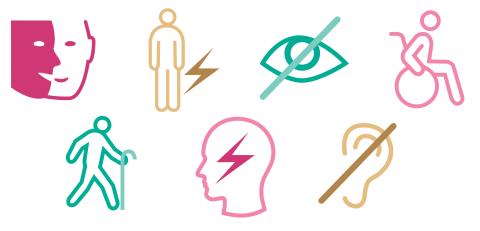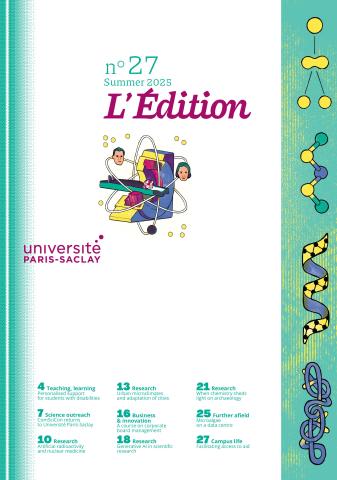
Disability: personalised support to help every student thrive
This article was originally published in L'Édition n°27.
Committed to inclusion, Université Paris-Saclay has created a network of advisors and a range of resources and initiatives so that young people with disabilities can pursue their studies in the best possible conditions, regardless of their disability.
"Higher education is more challenging with a disability. If you want to get to the same place as everyone else, you really do have to work harder," says Gaëlle Vitali-Derrien. A graduate of CentraleSupélec and now a postdoctoral researcher, she was thirteen when she was diagnosed with myopathy. "It's an invisible disability, but one that had a major impact throughout my time at school and university. I had to miss classes because of the treatments and I also had to deal with side effects." This did not stop the young woman from pursuing her academic career through to doctoral level, and defending her physics thesis last year.
At the start of the 2024/2025 academic year, nearly 65,000 students with disabilities were enrolled at French higher education institutions. This is nine times more than twenty years ago, when the Law of 11 February 2005 on equal rights and opportunities for people with disabilities was adopted. "Nationally, the number of students with disabilities increases by 15% every year," explains Clotilde Coron, Vice-President of Equality, Diversity and Inclusion at Université Paris-Saclay. At Université Paris-Saclay alone, the number of students has risen from around 900 in 2017/2018 to some 2,300 in 2023/2024. This increase is not only due to earlier diagnoses, but also to greater awareness of disabilities in institutions. "There are now much more personalised arrangements in place," notes Clotilde Coron. "And that's a good thing because it allows everyone involved to complete their studies with as few obstacles as possible."
One of the objectives of Université Paris-Saclay's Disability Master Plan, which is currently being revised and is available to view online, is to ensure young people with disabilities have the best possible conditions to succeed in their studies. "It's a six-part action plan covering both students and staff with disabilities. But there are specific measures for the student population on issues such as exams, professional integration and international mobility, to name just a few," says the Vice-President. These initiatives are available from the first year of study, across all faculties, institutes, Grandes Écoles and associate institutions of Université Paris-Saclay.
"We do everything we can to adapt"
To support these students, Université Paris-Saclay relies on an extensive network of advisors. "Each of the university's constituent faculties and institutes has a disability advisor whose role is to respond to any needs for adjustments and support," explains Gwennaël Pacé, Head of the university's Diversity and Disability Office. Once registered, students have two ways of getting in touch: either through their organisation's disability advisor, or through the university's Diversity and Disability Office. They are then referred to the prevention doctor at the Student Health Service (SSE), who is authorised to review the student's medical file and recommend the necessary adjustments. "These steps must be taken as soon as possible after registration, so that the student can be identified and the right support measures put in place," explains Gwennaël Pacé.
"If the adjustments are not feasible, we bring together a multidisciplinary team to assess the situation and suggest an alternative," she continues. "It's important to bear in mind that support is becoming increasingly personalised and we do everything we can to adapt.” The possible adjustments vary depending on the individual and their disability, and may relate to learning, exams or competitive exams. For example, support may include the loan of specialised equipment, a photocopying card or an access badge for lifts. Or it could mean agreeing to extend the duration of studies, adapting timetables or making allowances for absences or late arrivals.
"At CentraleSupélec, it was the first time I'd had a disability advisor, a direct contact who could give me advice. That was reassuring because I didn't really need any special arrangements, apart from the possibility that I would be absent and need to catch up later," recalls Gaëlle Vitali-Derrien. Support can also include human assistance, such as tutoring, note-taking for lectures or a scribe during exams to assist students who are unable to write themselves (see below). One-off adjustments can also be made if required. "Recently, we were contacted by a student with autism who was going through a particularly bad period of anxiety and was unable to travel for an exam. So we arranged for him to sit the exam remotely and supervised him using monitoring software," explains Gwennaël Pacé.
Specific support for neurodevelopmental disorders
Université Paris-Saclay is particularly committed to supporting young people suffering from neurodevelopmental disorders (NDD) including autism spectrum disorder (ASD), "dys" disorders - related to language or writing - and attention deficit disorder with or without hyperactivity (ADHD). On 25 March, it took a further step in its commitment by signing the Atypie-friendly charter. This programme, launched in 2018 by fifteen universities, including Université Paris-Saclay, aims to promote the inclusion of people with NDDs. As of 2025, around one hundred students have benefited from this programme.
By signing the charter, Université Paris-Saclay has formalised its long-standing commitment and strengthened the action sit has been implementing for several years. These actions include the introduction of consultations with a neuropsychologist soas to reduce the lengthy delays in accessing a diagnosis. The university has also set up NDD awareness courses for its staff, and launched friendly "atypical café" events for affected students. In terms of facilities, relaxation rooms have been set up at all the university's constituent faculties and institutes and several libraries have been fitted with soundproof booths with priority access for young people suffering from these disorders.
Thirty-four disability PhD contracts funded in eight years
Although students with disabilities account for around 2% of the student population in France, only a small number go on to pursue a PhD. To encourage this type of study, Université Paris-Saclay, through its Maison du Doctorat (Doctoral House), is taking part in the "DisabilityPhD" campaign launched by the French Ministry of Higher Education and Research. This scheme provides three years of funding for a PhD for young people with disabilities, with the option to extend beyond that. "Every year, the Maison du Doctorat launches a call for Master's students and PhD candidates to apply for this funding," explains Ekaterina Parshukova, Doctoral Student Life Manager at Université Paris-Saclay's Student Life and Equal Opportunities Department (DVEEC) and the Maison du Doctorat. Applications, which must include recognition of disabled worker status (RQTH), must be submitted to the doctoral school to which the student belongs.
Since 2016, 34 PhD contracts for students with disabilities have been funded, including 21 through the Maison du Doctorat call and 13 by the Ministry. Gaëlle Vitali-Derrien is one of the PhD candidates to have benefited from the scheme, in addition to the support provided by the disability office: "This period is a real turningpoint, because you're still a student but you also have a work contract, it's the start of your career. Thanks to the PhD disability contract, I was able to start with peace of mind and work while taking care of my health," she explains. "I also received a contract extension that enabled me to complete a thesis that truly reflected my work, rather than one that had to be scaled back due to health issues." It's an experiencethat the young researcher is happy to share today, notably through the 100% Handinamique association, which she discovered by chance during her PhD through her disability advisor. She is now one of its vice-presidents. "I know thatsupporting students with disabilities isn't easy because there aren't many of them. But, for me, the help I received was life-saving. That's why it's important to continue our efforts, to acknowledge the challenges associated with disability, and to build a more inclusive ecosystem."
Learn more about :
Support jobs to assist students with disabilities
When necessary, students with disabilities can receive support from fellow students without disabilities. "It's a peer-to-peer support system," explains Gwennaël Pacé, Head of the Diversity and Disability Office at Université Paris-Saclay. There are three possible roles for these assistants: a tutor, who helps with work organisation, task planning, etc.; a note-taker, who transcribes lectures; and an exam secretary, who assists the student with a disability by writing or speaking for them during exams. There's also a fourth role, that of a university ambassador, who takes part in awareness and communication campaigns related to the issues around disability.
Whatever their chosen role, "student assistants are paid and contracts can be annual, monthly or shorter, it's quite flexible. It's a great way to take on a role that supports others," notes Gwennaël Pacé. Every year, presentations promoting this scheme are made at start-of-year events. However, students can apply throughout the year by contacting the Diversity and Disability Office or the disability advisor in their organisation.

This article was originally published in L'Édition n°27.
Find out more about the journal in digital version here and on Calameo.
For more articles and topics, subscribe to L'Édition and receive future issues: